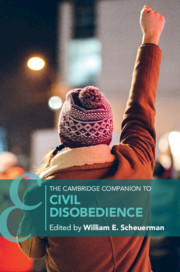40 results
7 - Weimar on the Potomac?
-
-
- Book:
- Weimar's Long Shadow
- Published online:
- 26 September 2024
- Print publication:
- 27 June 2024, pp 170-198
-
- Chapter
- Export citation
From Labor Sit-Downs to Civil Rights Sit-Ins: A Genealogy of Liberal Civil Disobedience
-
- Journal:
- The Review of Politics , First View
- Published online by Cambridge University Press:
- 14 March 2024, pp. 1-25
-
- Article
-
- You have access
- Open access
- HTML
- Export citation
17 - The Frankfurt School and the Rule of Law
- from Part IV - Pathologies
-
-
- Book:
- The Cambridge Companion to the Rule of Law
- Published online:
- 03 August 2021
- Print publication:
- 12 August 2021, pp 312-327
-
- Chapter
- Export citation
Contents
-
- Book:
- The Cambridge Companion to Civil Disobedience
- Published online:
- 24 June 2021
- Print publication:
- 15 July 2021, pp v-vi
-
- Chapter
- Export citation
Index
-
- Book:
- The Cambridge Companion to Civil Disobedience
- Published online:
- 24 June 2021
- Print publication:
- 15 July 2021, pp 429-440
-
- Chapter
- Export citation
Part I - Plural Voices, Rival Frameworks
-
- Book:
- The Cambridge Companion to Civil Disobedience
- Published online:
- 24 June 2021
- Print publication:
- 15 July 2021, pp 27-200
-
- Chapter
- Export citation
Copyright page
-
- Book:
- The Cambridge Companion to Civil Disobedience
- Published online:
- 24 June 2021
- Print publication:
- 15 July 2021, pp iv-iv
-
- Chapter
- Export citation
15 - Whistleblowing as Civil Disobedience
- from Part III - Changing Circumstances, Political Consequences
-
-
- Book:
- The Cambridge Companion to Civil Disobedience
- Published online:
- 24 June 2021
- Print publication:
- 15 July 2021, pp 384-406
-
- Chapter
- Export citation
Part II - Different Elements, Competing Interpretations
-
- Book:
- The Cambridge Companion to Civil Disobedience
- Published online:
- 24 June 2021
- Print publication:
- 15 July 2021, pp 201-310
-
- Chapter
- Export citation
Part III - Changing Circumstances, Political Consequences
-
- Book:
- The Cambridge Companion to Civil Disobedience
- Published online:
- 24 June 2021
- Print publication:
- 15 July 2021, pp 311-428
-
- Chapter
- Export citation
Introduction: Why, Once Again, Civil Disobedience?
-
-
- Book:
- The Cambridge Companion to Civil Disobedience
- Published online:
- 24 June 2021
- Print publication:
- 15 July 2021, pp 1-26
-
- Chapter
- Export citation
Contributors
-
- Book:
- The Cambridge Companion to Civil Disobedience
- Published online:
- 24 June 2021
- Print publication:
- 15 July 2021, pp vii-xii
-
- Chapter
- Export citation

The Cambridge Companion to Civil Disobedience
-
- Published online:
- 24 June 2021
- Print publication:
- 15 July 2021
Recalling and/or Repressing German Marxism? The Case of Ernst Fraenkel
-
- Journal:
- Modern Intellectual History / Volume 19 / Issue 3 / September 2022
- Published online by Cambridge University Press:
- 26 March 2021, pp. 971-981
-
- Article
- Export citation
Can Political Institutions Commit Civil Disobedience?
-
- Journal:
- The Review of Politics / Volume 82 / Issue 2 / Spring 2020
- Published online by Cambridge University Press:
- 20 April 2020, pp. 269-291
-
- Article
- Export citation
176. - Franz L. Neumann (1900–1954)
- from II - Names
-
-
- Book:
- The Cambridge Habermas Lexicon
- Published online:
- 29 March 2019
- Print publication:
- 11 April 2019, pp 632-633
-
- Chapter
- Export citation
192. - Carl Schmitt (1888–1985)
- from II - Names
-
-
- Book:
- The Cambridge Habermas Lexicon
- Published online:
- 29 March 2019
- Print publication:
- 11 April 2019, pp 677-679
-
- Chapter
- Export citation
95. - Radical Reformism
- from I - Terms
-
-
- Book:
- The Cambridge Habermas Lexicon
- Published online:
- 29 March 2019
- Print publication:
- 11 April 2019, pp 367-368
-
- Chapter
- Export citation
Final Words?
-
- Journal:
- German Law Journal / Volume 7 / Issue 2 / 01 February 2006
- Published online by Cambridge University Press:
- 06 March 2019, pp. 227-231
-
- Article
-
- You have access
- Export citation
Debating the American State: Liberal Anxieties and the New Leviathan, 1930–1970. By Anne M. Kornhauser. Philadelphia: University of Pennsylvania Press, 2015. 336p. $59.95 cloth.
-
- Journal:
- Perspectives on Politics / Volume 15 / Issue 4 / December 2017
- Published online by Cambridge University Press:
- 20 November 2017, pp. 1131-1132
- Print publication:
- December 2017
-
- Article
- Export citation

